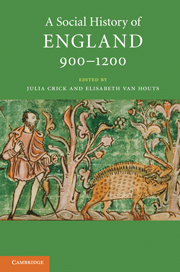Book contents
- Frontmatter
- Contents
- List of figures
- List of maps and tables
- List of contributors
- Acknowledgements
- List of abbreviations
- Map 1 England and its neighbours
- Map 2 England 900–1200
- I Introduction
- I.1 Land use and people
- I.2 Water and land
- I.3 Forest and upland
- I.4 Mineral resources
- I.5 Health and disease
- II.1 Authority and community
- II.2 Lordship and labour
- II.3 Order and justice
- II.4 War and violence
- II.5 Family, marriage, kinship
- II.6 Poor and powerless
- III.1 Towns and their hinterlands
- III.2 Commerce and markets
- III.3 Urban planning
- III.4 Urban populations and associations
- IV.1 Invasion and migration
- IV.2 Ethnicity and acculturation
- IV.3 Intermarriage
- IV.4 The Jews
- V.1 Religion and belief
- V.2 Rites of passage and pastoral care
- V.3 Saints and cults
- V.4 Public spectacle
- V.5 Textual communities (Latin)
- V.6 Textual communities (vernacular)
- VI.1 Learning and training
- VI.2 Information and its retrieval
- VI.3 Esoteric knowledge
- VI.4 Medical practice and theory
- VI.5 Subversion
- Glossary
- Time line 900–1200
- Further reading
- Index
V.6 - Textual communities (vernacular)
Published online by Cambridge University Press: 05 June 2012
- Frontmatter
- Contents
- List of figures
- List of maps and tables
- List of contributors
- Acknowledgements
- List of abbreviations
- Map 1 England and its neighbours
- Map 2 England 900–1200
- I Introduction
- I.1 Land use and people
- I.2 Water and land
- I.3 Forest and upland
- I.4 Mineral resources
- I.5 Health and disease
- II.1 Authority and community
- II.2 Lordship and labour
- II.3 Order and justice
- II.4 War and violence
- II.5 Family, marriage, kinship
- II.6 Poor and powerless
- III.1 Towns and their hinterlands
- III.2 Commerce and markets
- III.3 Urban planning
- III.4 Urban populations and associations
- IV.1 Invasion and migration
- IV.2 Ethnicity and acculturation
- IV.3 Intermarriage
- IV.4 The Jews
- V.1 Religion and belief
- V.2 Rites of passage and pastoral care
- V.3 Saints and cults
- V.4 Public spectacle
- V.5 Textual communities (Latin)
- V.6 Textual communities (vernacular)
- VI.1 Learning and training
- VI.2 Information and its retrieval
- VI.3 Esoteric knowledge
- VI.4 Medical practice and theory
- VI.5 Subversion
- Glossary
- Time line 900–1200
- Further reading
- Index
Summary
DEFINING THE TEXTUAL COMMUNITY
The literate, Latinate elite of Anglo-Saxon England represents specific social and intellectual groups – those men and women fortunate enough to be educated through an institutional system that was religious, and principally monastic. Many of these privileged learners would have been aristocratic, or at least freeborn, as Alfred recommends in his Preface to Gregory's Pastoral Care. This Preface was written by Alfred towards the end of the ninth century, when he recognized that the consolidation of the truce with the Danes would require rebuilding a country devastated by a century of strife. Part of this reconstructive process involved the conscious fostering of education, so that the rich cultural and intellectual traditions of Anglo-Saxon England could be permitted to flourish once again. In the extant manuscript, Oxford, Bodleian Library, Hatton 20, given to Wærferth, bishop of Worcester, at the end of the ninth century, Alfred reveals his educational plans to his bishop, in what has become one of the most famous passages of early English:
Therefore it seems better to me, if it seems so to you, that we also should translate certain books, which are most necessary for all men to know, into the language that we can all understand, and also arrange it, as with God's help we very easily can if we have peace, so that all the young freeborn men now among the English people who have the means to be able to devote themselves to it, may be set to study for as long as they are of no other use, until a time when they are able to read English writing well. […]
- Type
- Chapter
- Information
- A Social History of England, 900–1200 , pp. 341 - 351Publisher: Cambridge University PressPrint publication year: 2011
- 1
- Cited by



